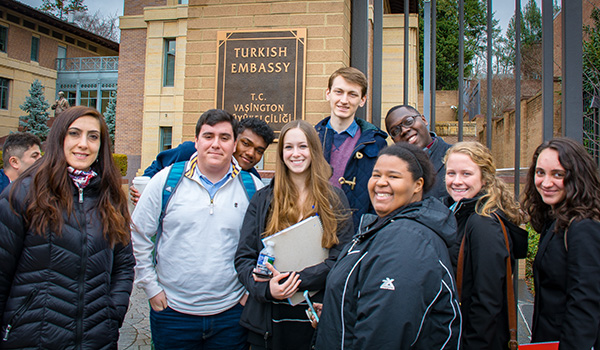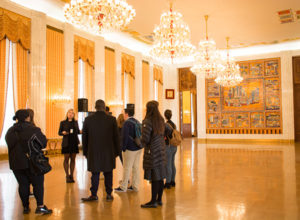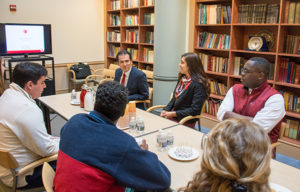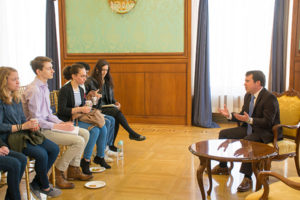
What do Turkish and Russian diplomats have to say about the refugee crisis in Syria? How about their opinion on the importance of cultural diplomacy and “soft power”? This month, GAP students got the inside scoop on what it means to be among the most influential global leaders in international politics, in two countries that have fostered unique relationships with the United States.
As Communications Coordinator for American University’s School of Professional & Extended Studies, my job is to highlight the stories of our students — be it an uplifting profile on a student fighting for veterans’ rights, or an event preview that discussed race, politics, poetry, and the internet age. At the Russian Embassy this month, students me t with Deputy Head of the Economic Section, Grigory Zasypkin. At the Turkish Embassy the following week, they attended a private seminar on cultural diplomacy with Embassy Counselor Celil Erdogan.
t with Deputy Head of the Economic Section, Grigory Zasypkin. At the Turkish Embassy the following week, they attended a private seminar on cultural diplomacy with Embassy Counselor Celil Erdogan.
At the Russian Embassy, students took part in a private tour of the opulent Ceremonial Building. Designed by Soviet architect Michael Posokhin, the 39-year-old construction is used for press conferences, public events, special receptions, seminars, and diplomatic meetings alike. Our tour guide for the afternoon truly said it best — the Russian Embassy is “a city within a city”!
Just a 20-minute walk away, in the heart of Washington, D.C.’s famed Embassy Row neighborhood, Mr. Erdogan and GAP International Relations professor Gul Gur lead an enriching discussion on the constructs of Erdogan’s work. He also went into depth about the success of past diplomatic campaigns and how they ventured to sh owcase Turkish national identity to a wider global audience. One such campaign is their annual “Turkey Home” event, where artists, journalists, clergymen, intellectuals and other “opinion makers” come together at the Ministry of Culture and Tourism in Ankara to network and forward the mission of culture-making in Turkey.
owcase Turkish national identity to a wider global audience. One such campaign is their annual “Turkey Home” event, where artists, journalists, clergymen, intellectuals and other “opinion makers” come together at the Ministry of Culture and Tourism in Ankara to network and forward the mission of culture-making in Turkey.
One of the most powerful takeaways from these visits was how receptive and collaborate these diplomats came across to our students. They were invested in opening the floor for enriching discussions — especially as they relate to the ways they can show the richness of their respective cultural histories. Perhaps much of the reason why th ey have achieved the positions they hold today is due to their pride and gratitude for being an visible representative of their home countries.
ey have achieved the positions they hold today is due to their pride and gratitude for being an visible representative of their home countries.
What would you ask if you had the chance to sit down and chat with a diplomat?
-Kelly Kimball, Communications Coordinator